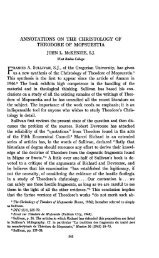SYMBOL, MYTH, AND THE BIBLICAL REVELATION AVERY ...
SYMBOL, MYTH, AND THE BIBLICAL REVELATION AVERY ...
SYMBOL, MYTH, AND THE BIBLICAL REVELATION AVERY ...
You also want an ePaper? Increase the reach of your titles
YUMPU automatically turns print PDFs into web optimized ePapers that Google loves.
<strong>SYMBOL</strong>, <strong>MYTH</strong>, <strong>AND</strong> <strong>THE</strong> <strong>BIBLICAL</strong> <strong>REVELATION</strong><br />
IS<br />
creative expressions of the Israelite spirit, myths might well serve as<br />
building blocks of the great temple which was to receive its capping<br />
stone in Christ. We believe, therefore, that myths cannot be excluded<br />
on principle from the Bible on the ground that they are "fabula religiosa<br />
falsa" (Nicolau, no. 188), but that the question should be<br />
resolved a posteriori. We should examine what is actually to be found<br />
in the biblical books, conducting this search in the light of the notion<br />
of myth we have derived from comparative religion and ethnology.<br />
<strong>MYTH</strong> IN <strong>THE</strong> OLD TESTAMENT<br />
At first sight it would seem that myth bulks large in the Old Testament.<br />
Competent scholars are practically unanimous in recognizing in<br />
many sections of the Old Testament, especially in Genesis, reminiscences<br />
of myths which can likewise be found in Sumerian, Accadian,<br />
and Canaanite literature. 29 The stories of the formation of the world,<br />
the Garden of Eden, the Flood, and the Tower of Babel—to cite several<br />
well-known examples—would seem to be adaptations of primitive<br />
myths such as we find in other cultures. But once we allow the presence<br />
of mythical elements in the Bible, the question still remains intact: Are<br />
they still myths as they appear on the pages of Scripture?<br />
From the beginning of her existence as a people, the Israelites had<br />
an overriding conception of Yahweh which cannot be written off as<br />
myth. As McKenzie says, myth when left to its own resources remains<br />
imprisoned in the order of shifting phenomena; it merely retells the<br />
story of the phenomenal world on a larger scale, and is incapable of<br />
attaining the divine in its transcendence. 30 Since the time of Gunkel<br />
it has been a commonplace that Israel was not favorable soil for myths,<br />
since they link the divine with nature in a way contrary to that of the<br />
Bible and are basically incapable of overcoming polytheism. 31 As distinct<br />
from all the mythical gods, Yahweh is constantly portrayed by<br />
the Israelites as unique, free, and totally sovereign over every other<br />
power in heaven and on earth.<br />
29 For a convenient summary, cf. H. Cazelles, "Mythe et PA.T.," Diet, de la Bible,<br />
Supplement 6, 246-61. Also, more briefly, T. H. Gaster in Interpreter's Dictionary of the<br />
Bible 3, 481-87.<br />
*°Art. cit., p. 291.<br />
81 H. Gunkel, "Mythus und Mythologie im A.T.," Die Religion in Geschichte und Gegenwart<br />
4 (2nd ed., 1930) 381. Also G. Stahlin, art. "Mythos," in G. Kittel, Theologisches<br />
Worterbuch zum Neuen Testament 4, 787.
















